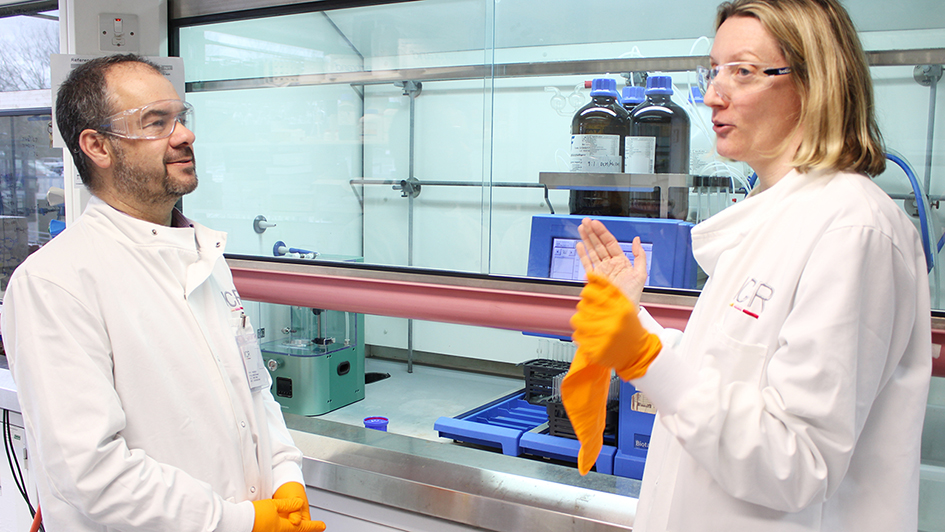Local MP Paul Scully donned a lab coat and safety specs to spend a day as a cancer researcher working in the Sutton laboratories of The Institute of Cancer Research, London.
The Conservative party Member of Parliament was taking part in the Royal Society’s pairing scheme, which allows politicians and scientists to experience each other’s worlds, and was paired with a cancer drug discovery scientist at The Institute of Cancer Research (ICR).
Knowledge exchange
In November 2018, Mr Scully hosted Dr Nicola Chessum from the ICR as part of the scheme.
Dr Chessum was given a tour around the Houses of Parliament and attended a series of talks that explained how legislation is passed and how Select Committees provide evidence reports to MPs to assist in making policy decisions. She then attended various drop-in sessions with the MP, including a rocket science competition for school children.
Dr Chessum has now returned the favour by hosting Mr Scully at the ICR, where she works in the Division of Cancer Therapeutics, which is responsible for discovering new cancer drugs. Spending a day in the life of a medicinal chemist, he was shown how new cancer drugs are discovered.
This involved seeing a range of techniques in different laboratories and getting the opportunity to put them into practice himself at the lab bench. He also saw how the latest computer techniques are used to speed up the process of designing new cancer drugs.
Paul also spent some time chatting to a number of the ICR’s PhD students, and shared different ways they can get involved in influencing policy.
Inspiring, surprising, and valuable
Paul Scully, MP for Sutton and Cheam, said:
“It’s been really valuable to get a deeper understanding of the complexity of what’s behind cancer research, and how it always has to evolve to keep up with the latest advances. This is something I’ll take back to my colleagues in Westminster, as it’s so important when thinking about how the Government helps to fund medical research.
“It was inspiring to see the passion of Nicola and the other scientists at the ICR – I’m so proud to have such a fantastic institution, which is making a huge difference for cancer patients around the world, in our constituency.”
Dr Nicola Chessum, Senior Scientific Officer in the Division of Cancer Therapeutics at The Institute of Cancer Research, London, said:
“I was really surprised at the variety of information Paul handles, as an MP, in a single day. It was a great opportunity for me to get an insight into the life of an MP and see the value of scientific evidence in developing public policy.
“During his visit, Paul showed a lot of the characteristics needed to have a successful career in science – he was very curious and also determined. It takes determination and persistence to keep going and make progress in research. You have to be able to be able to deal with the ups and downs – much like politics!”
From bench to bedside
The ICR is the world’s most successful academic organisation at discovering new cancer drugs, and the most successful higher education institution in the UK at earning invention income from its science. Royalties from ICR discoveries are ploughed back into the organisation’s research for the benefit of cancer patients.
Since 2005 the ICR has discovered 20 new targeted cancer drugs and taken 10 into clinical trials. Through its close partnership with The Royal Marsden NHS Foundation Trust, the ICR is able to ensure rapid transfer of research discoveries to patients.
Abiraterone, a highly innovative drug for advanced prostate cancer discovered at the ICR, was approved for use on the NHS in 2012 and has extended the lives of hundreds of thousands of men around the world.
We're making ground-breaking discoveries in cancer research. Help us defeat cancer.
The ICR’s science also underpinned the development of olaparib for women with ovarian cancer with BRCA mutations – firstly through the discovery of the BRCA2 gene, and subsequently by showing that BRCA-mutant tumours were particularly susceptible to the new treatment.
Olaparib was approved for women with advanced ovarian cancer and inherited BRCA mutations in Europe and the US in 2014, and last year was approved in the US for women with advanced breast cancer and BRCA mutations.
The ICR is the leading higher education institution in the UK for research quality and impact and is also a charity, relying on support from partner organisations, donors and the general public.
Find out more about the ICR’s achievements in discovering new cancer drugs.
